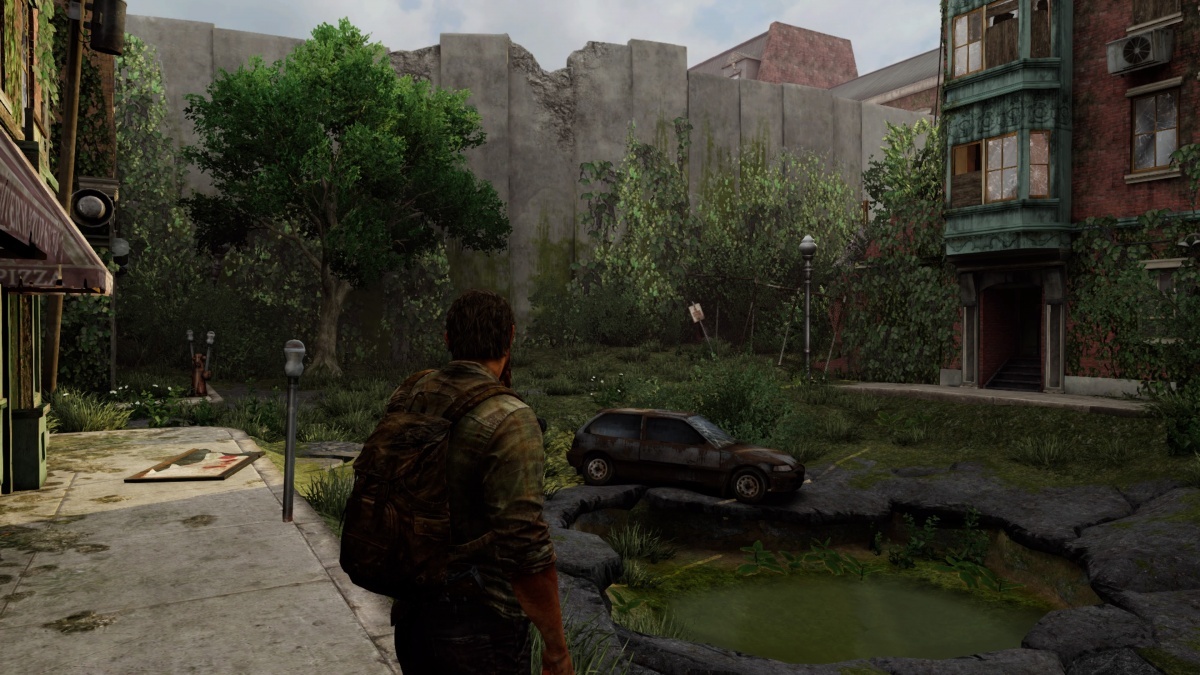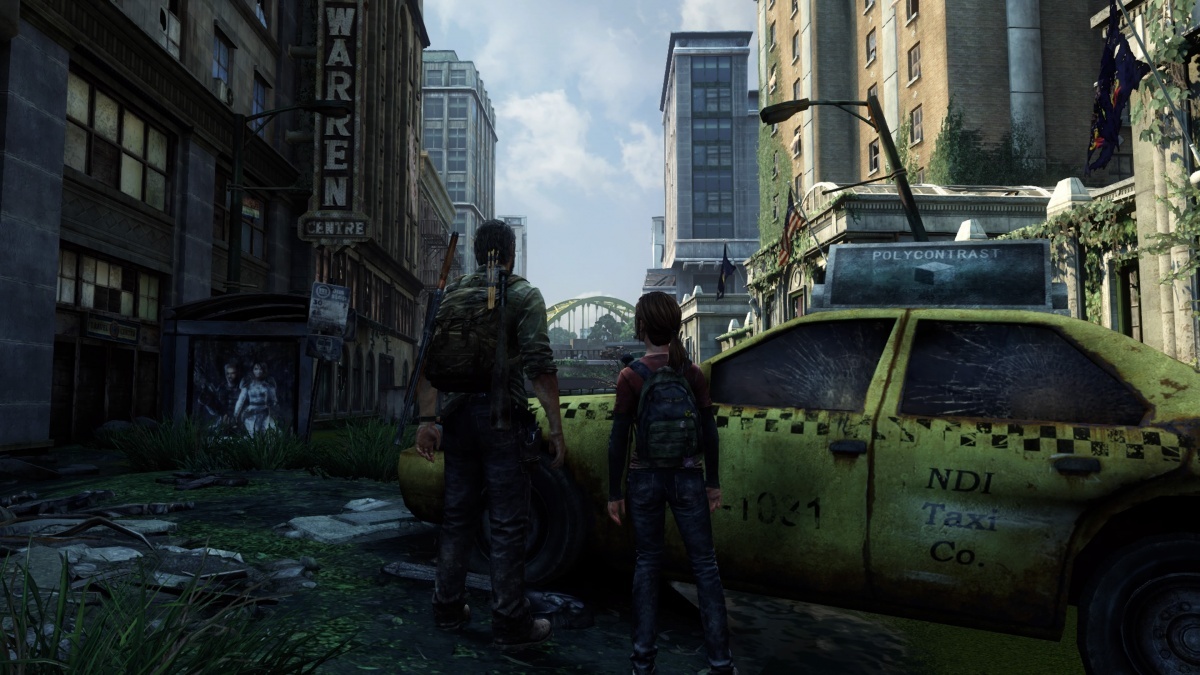The Last of Us Remastered (PlayStation 4) Review
By Athanasios  28.07.2020
28.07.2020

This retrospective review is an alternative look on The Last of Us, and more specifically, its PlayStation 4, remastered edition, from someone who isn't exactly fond of "cinematic" video games, due to how these tend to blur the lines between video games and films a bit more than they should. To provide a more concrete example of who is writing the following article, yours truly didn't enjoy playing the Uncharted series, but loved watching them in YouTube with a big bucket of popcorn on his lap. The Last of Us is kind of the same deal, with simple gameplay that's definitely fun, but also feels like filler between the much more interesting story segments; linear level design despite a certain level of freedom in how one can approach a situation; and, finally, a somewhat low level of challenge, and emphasis in realism rather than traditionally "gamey" fun. For some reason, however, this didn't bore this critic as much as the rest of its ilk. Right before venturing into the bleak world of The Last of Us Part II, Cubed3 enters post-fungus-apocalyptic Boston, and explains why.
After being introduced to the protagonist, a man named Joel, plus his daughter Sarah, the player is given control of the girl. Wondering around the empty house, she begins to feel that something is wrong. The news channel guy is a bit more terrified than usual; an explosion can be heard in the distance; and her dad, who has just burst into the living room, acts as if he is being chased. Well, it just so happens that he is. A man comes crashing through the glass door, without a single care for his open wounds, and with eyes wild with murderous fury. Moments later, he gets shot down by Joel. In an intro that is rightfully being regarded as one of the industry's very best, it's made clear that this is the beginning of a zombie apocalypse. Fortunately, the focus isn't on that.

Like all good zombie tales, from Resident Evil to I Am Legend, and from World War Z to The Walking Dead, this isn't about the monsters themselves. That's not to say that the ones here are bad. Avoiding the overused virus excuse, a type of fungi is now doing the deed. Insignificant detail? Not really. Apart from having a very interesting scientific basis that hasn't been explored as much in fiction, a fungus is a threat that's a bit more "tangible" than a microscopic, invisible virus, which is something that humans don't really fear instinctively. Plus, the way a fungus "mutates" its victims and the environment looks far nastier - as those with mycophobia and/or trypophobia can agree with.
But again, this isn't about the zombies, but about their effect on the world; a world viewed through the eyes of Joel, whose journey starts 20 years after the outbreak, and the loss of everything he once cared about. Oh, yeah, there's death and misery here, alright. Thankfully, while there's an abundance of darkness, there's not much manipulative melodrama in the portrayal of this dystopia. The cold, cynical, almost indifferent presentation makes sure to let the audience think for itself. Yes, Joel is a smuggler that has done some bad things to survive; yes, humanity has succumbed to its bestial side; and, yes, things rarely don't go south… but that's just the way it is. Endure and survive.

In the Unites States of The Last of Us one can choose between depressing quarantine zones under strict martial law, highly dangerous, deserted cities ruled by ruthless bandits, with the flesh-eating infected filling the blanks - and it's this hostile world that Joel will have to brave in order to escort a teenage girl named Ellie to the base of the Fireflies, the paramilitary resistance group that supposedly wants to find a cure for the infection. You know where this is going, right? The following isn't a spoiler, as it is way too predictable: Ellie carries within her the solution to humanity's mushroom problem. Not very original, right? Worry not, as the core of the plot… isn't the plot itself.
There's a bit of survival horror here, as well as the expected commentary on the whole post-apocalyptic situation. If want survival horror, however, go to Resident Evil 2, and if you want a good post-apocalypse, try Fallout. This is, beyond any doubt, a road trip that's all about Joel's relationship with Ellie - and like all good road trips, it takes its sweet time with… well, everything, honestly. Don't expect this to hammer you with cut-scene after cut-scene, and tons of dialogue. Joel and Ellie will spend most of their time in silence. They won't go into much detail about their past or thoughts, and when they do, they'll usually do so reluctantly, and with the use of just a few sentences.

It's quite surprising for a major league, triple-A, mainstream title, to not be that big on sharing; insinuating things, instead of straight up spewing them out. This massively helps with getting players immersed and interested in the story and the characters on offer, and, make no mistake, this is the meat of the experience. The gameplay is fine and all, but the essence of The Last of Us lies in Joel's chance to mend his scarred soul through Ellie, who is initially nothing more than cargo, and slowly becomes a character he cares and fears for. Yes, there's death and misery here, but there's also a faint glimmer of hope, and it's that glimmer that keeps Joel, and the player going.
In conclusion, forget the action. This is a character-driven drama. It's important to note that it's also quite the slow burn. It'll take a couple of hours to get things going, so if easily bored with leisurely-paced adventures, stay away… and miss out on the fun, as the characters are worth the "trouble." Sure, some are better than others, with Ellie n particular being one of the weakest ones in here (at least initially), but it's them who make this such an awesome experience, not those that hunt them down. The characters are so darn good that by the end of this 12-hour odyssey, Joel (a walking masterpiece), has become a "real" person that the player will really care for - besides getting the hots for him.

Oh, yeah. The Last of Us looks fantastic. This critic generally leans more towards striking art styles rather than photorealism, but it's hard not to love what Naughty Dog has done here. Apart from being a technical marvel that holds up after so many years (with the remaster improving the textures), there's an immense attention to detail anywhere you look, even in things that you won't even give a second glance. The world you'll traverse can be described as beautiful wreckage, with nature slowly claiming what death and destruction have left behind, and the way the scale and perspective has been handled makes you feel like a puny creature walking through enormous cities and wild lands.
What about the gameplay, though? This is a game after all, isn't it? Well, the thing with this is that it can occasionally feel like it would probably be much better as a movie or even a book. Is it bad? No, but gameplay is definitely not this title's best aspect. This is your basic third-person action-adventure, where you can shoot, hide, and do some light puzzle-solving, but it's exactly that: basic, and as a result pales in comparison to a "real" shooter, stealth game, or puzzler. Then you have those actions that are typical of cinematic titles, where you hold square to push an object, or hold triangle to raise a door - engrossing the first couple of times, annoying after the 100th one.

...But again, this isn't bad. Gunplay is very solid, using your arsenal feels great, with the intentionally unsteady aim making you feel the tension of having to make a shot; stealth kills add that extra coolness, and, if skilled enough, it's even possible to avoid confrontations entirely; exploring ruins and abandoned apartments provides you with resources to craft helpful items, be it explosives, Molotov cocktails, or shivs for some nice and quiet murdering, and so on. The infected add an extra layer of thrill, mainly through the use of the Clickers; an extremely lethal type of infected that, although blind, can echolocate your behinds if you aren't careful with the way you move towards them... or away.
Unfortunately, The Last of Us just doesn't have many things to do, and runs out of ideas with what to do with the thing it does have. The result is almost five (and more) hours or filler, with the player pretty much doing the same things again and again, to the point that encountering a group of bandits or infected just when things were beginning to get really interesting story-wise, will get you to moan "not again!" rather than make you feel excited and ready for battle. The final stretch is the perfect example of the problem. It throws everything and the kitchen sink at you, but you've done it all a hundred times, and thus both encounters will be a - boring - piece of cake.

Regarding this remastered version, don't expect any significant changes in the gameplay department. In fact, don't expect any, as this is mostly a visual upgrade - a very good one at that. It's safe to say, however, that it's the definite version, as it includes all additional content, which means in-game commentary from the cast and the creative director, as well as a prequel chapter that delves into Ellie's past. Players also get a bunch of new multiplayer maps, but they still have to pay for cosmetics. Oh, yeah. The Last of Us has an online component. How good is it, you ask? Take any generic third-person shooter from the PS3, make it a bit more generic... and there you go!
Now, as previously mentioned, this reviewer isn't the "right" gamer for this type of game, and that's why the few available flaws are magnified in his mind. The thing is that The Last of Us sort of has to "sacrifice" some traditional video game conventions, in order to immerse you into its world and story. It's an experience that doesn't just want to entertain. It's not a perfectly balanced experience, but it's a darn good one, no doubt about it. Upon finishing this, yours truly felt that he didn't want to ever play this again in fear of revisiting its many dull parts, but somewhere in his heart, he knows he will. He will endure its subpar lows, so that he can enjoy its excellent highs one more time.
The magnificent ending is enough reason to do so...

Cubed3 Rating
Exceptional - Gold Award

A post-apocalyptic road trip that offers a fantastic, riveting experience, where destruction and beauty, and hope and despair, get entwined in a way that’s nothing short of genius, The Last of Us is so good that its somewhat repetitive, and occasionally dull gameplay isn’t enough to rob it of its rightful place amongst the video game greats. Therefore, if looking for an unforgettable action-adventure, with strong cinematic sensibilities, and a heavy emphasis in adult, character-driven storytelling, look no further than Naughty Dog’s classic, especially now that the remastered version has made the original even more stunning.

![]() 9/10
9/10
![]() 7/10
(1 Votes)
7/10
(1 Votes)
 Out now
Out now  Out now
Out now  Out now
Out now  Out now
Out now Comments
Comments are currently disabled

 Sign In
Sign In Game Details
Game Details Subscribe to this topic
Subscribe to this topic Features
Features





 Top
Top

